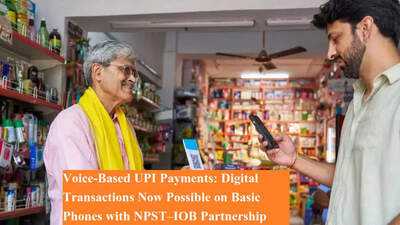The dream of a truly inclusive Digital India is now closer to reality. Network People Services Technologies Ltd (NPST), a leading digital banking and payment solutions provider, has received an order from Indian Overseas Bank (IOB) to implement voice-based UPI 123Pay, enabling seamless digital payments through feature phones — even without internet access. This initiative marks a major step toward expanding financial inclusion across India, especially among rural and elderly populations.
Digital Payments through Voice CommandsThe UPI 123Pay system allows users to make payments using simple voice commands. Unlike traditional UPI apps that require internet and smartphones, this system works through Interactive Voice Response (IVR) technology. Users can initiate a transaction by making a call, enter the amount, and authenticate using their UPI PIN — all without any data connection.
This solution is designed particularly for those who still rely on feature phones or struggle with digital interfaces. With voice-guided steps, the process becomes intuitive and user-friendly, ensuring that no one is left behind in India’s digital payment revolution.
NPST and MissCallPay CollaborationTo bring this vision to life, NPST is collaborating with MissCallPay, a fintech company known for its innovative missed call and IVR-based payment solutions. Under this partnership, users can simply give a missed call to a designated number. They will then receive a callback, through which they can complete transactions using voice prompts or keypad inputs.
MissCallPay’s technology simplifies digital banking for non-smartphone users, ensuring convenience, accessibility, and safety — all without internet connectivity.
How the System WorksHere’s how the voice-based UPI 123Pay works step by step:
The customer gives a missed call to a specific number provided by the bank.
They receive an automated callback from the system.
During the call, the user specifies the payment amount.
They enter their UPI PIN to authenticate the transaction.
A confirmation message is sent once the payment is successfully processed.
This process is completely secure and works without any dependency on mobile data or Wi-Fi, making it ideal for rural and remote areas where internet access is limited.
Targeting India’s 850 Million Non-UPI UsersAccording to NPST, nearly 850 million Indians still don’t use UPI services. Around 400 million of them are feature phone users. The introduction of voice-based digital payments aims to bridge this digital divide, connecting millions of new users — particularly small shopkeepers, farmers, and elderly citizens — to the cashless economy.
Boost to the Digital India MissionThe initiative directly aligns with the government’s Digital India Mission, which aims to promote a cashless and inclusive economy. By empowering users without internet or advanced devices, UPI 123Pay is expected to accelerate digital adoption across semi-urban and rural regions.
Additionally, it supports the Reserve Bank of India’s (RBI) broader vision of expanding the reach of Unified Payments Interface (UPI) to every section of society.
Financial Inclusion through TechnologyThe NPST–IOB collaboration demonstrates how innovative fintech solutions can make financial systems more inclusive. With this step, millions who previously depended solely on cash transactions will now have the ability to pay digitally — safely, easily, and instantly.
As India continues to evolve into a digitally empowered economy, such technology-driven initiatives will play a crucial role in connecting the last mile and ensuring that financial empowerment reaches every citizen.
You may also like

Dengue claims six more lives in Bangladesh, 2025 death toll crosses 310

Is Giannis Antetokounmpo playing tonight vs the Houston Rockets? Latest update on the Milwaukee Bucks star's injury report (November 9, 2025)

At 46, Emraan Hashmi's skincare routine for glowing skin is so simple that it's hard to believe

Celtic fans boo Remembrance Sunday tribute as minute's silence cut short

Family alleges medical negligence after woman dies of post-delivery infection







